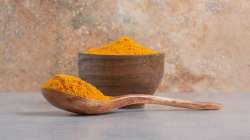Six significant benefits of wild turmeric you didn't know
Since ancient times, wild turmeric has been used to treat various ailments. Here are some of its significant benefits.

Wild turmeric is a significant part of Ayurvedic traditions. The yellow root is believed to offer various medicinal benefits, such as boosting bodily energy, reducing gas, getting rid of worms, enhancing digestion, controlling menstruation, removing gallstones, and alleviating arthritis. Turmeric has been used since ancient times for its antimicrobial and antibacterial properties in traditional Ayurvedic treatment, making it a staple of the Indian diet. It has a harsh flavour and camphor-like smell.
Curcumin, a phyto ingredient, is used to give turmeric its distinctive yellow hue and is incredibly nutritious for the joints as well as supporting a balanced inflammatory response. Scientifically known as Curcura aromatica and Kasturi Manjal in Hindi, the mighty herb can do wonders. Here are its few benefits:
Abundant anti-inflammatory properties:
Wild turmeric has antioxidant properties that make it an effective treatment for cough and sore throat. (Remedy: boil water and add a pinch of turmeric. (Drink twice a day.)
The herb has anti-cancer properties, which reduce the risk of developing chronic illnesses by preventing free radicals from harming healthy cells and slowing the growth and development of tumor cells. It also helps treat diabetes by keeping the sugar levels under control.
Boosts the Immune System:
Curcumin boosts the immune system, suppresses proinflammatory cytokines, and helps manage allergy disorders. T cells, B cells, and natural killer cells are all affected by curcumin, which may help fend off infection.
Heals wounds:
Kasturi manjal's natural healing properties can help treat wounds, minor cuts, scars, snake bites, and scrapes, speeding up the healing process and reducing scar tissue. Wild turmeric also possesses mosquito-repellent properties and cures mosquito bites.
Liver detoxification:
Turmeric is a valuable compound that can protect the liver from damage from carbon tetrachloride. It also protects the kidneys, heart, and brain. The herb helps treat a variety of neurological conditions, including Alzheimer's, Parkinson's, multiple sclerosis, dementia, and Huntington's disease.
Prevents Arthritis:
Turmeric is an anti-inflammatory, antioxidant, anti-cancer, and neuroprotective substance that may be beneficial for arthritis patients. The active component, curcumin, treats both inflammatory and degenerative arthritis. It can be eaten as a spice, added to tea, or taken as a supplement.
Best for skin:
The aromatic herb has been used in India for centuries as a natural beauty ingredient. It treats tans, prevents acne, evens out skin tone, dismisses oily skin, fights ageing, and may even remove facial hair